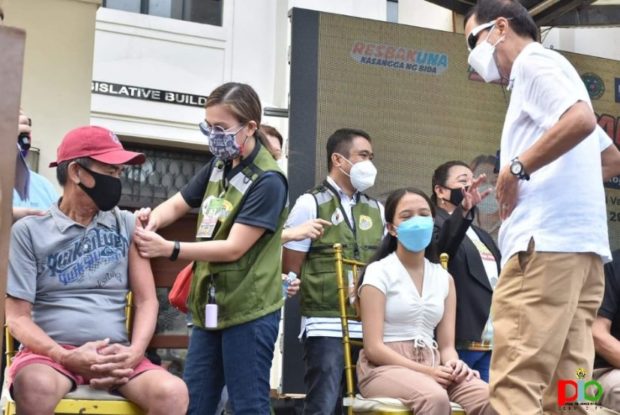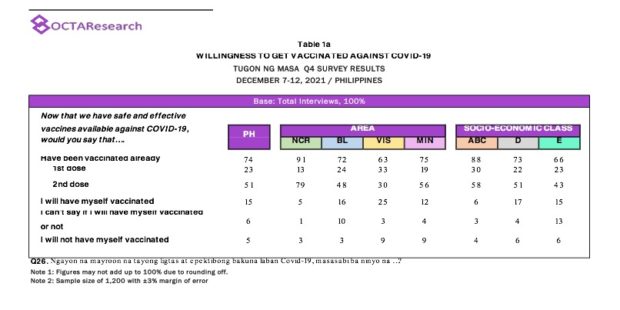Only 2% of fully jabbed Filipinos still contracted virus amid Omicron surge — OCTA

FILE Bayanihan Bakunahan in Cebu City last Last November 29, 2021. Image from Facebook / Cebu City Public Information Office
MANILA, Philippines — Only two percent of fully vaccinated adult Filipinos contracted COVID-19 from the period before the surge of the Omicron variant at the start of 2022, based on a survey conducted by independent pandemic monitor Octa Research.
In a report submitted by Octa to media on Wednesday, its fourth quarter Tugon ng Masa survey, conducted December 7-12, showed that prior to the onslaught of Omicron, a vast majority of respondents to the survey who are fully vaccinated claimed to have been spared from the disease.
“During the survey period, around 2 percent of adult Filipinos contracted COVID-19 even after being fully vaccinated or completing their vaccine dosage… On the other hand, 98 percent of fully vaccinated adult Filipinos did not contract the COVID-19 virus after completing their vaccine dosages,” Octa said.
Of those who tested positive for COVID-19, 47 percent used both antigen and RT-PCR test as a diagnostic test while 28 percent used antigen test only and four percent used RT-PCR test only.
However, 20 percent of the respondents who said they contracted COVID-19 did not use any diagnostic tests.
Article continues after this advertisementThe highest percentage of adults contracting COVID-19 after full vaccination is still Balance Luzon at three percent, followed closely by Mindanao and NCR at two percent and one percent, respectively.
Article continues after this advertisementMost respondents have received their COVID-19 vaccines at 74 percent, with 51 percent being fully vaccinated while 23 percent of respondents only received their first dose of COVID-19 vaccines.
Meanwhile, the group also reported that the vaccine hesitancy dropped nationwide after five percent of respondents said they are not willing to get vaccinated against COVID-19, which is a significant decline from the 22 percent vaccine hesitancy during their survey conducted during the third quarter of 2021 from September 11-16.
Octa’s survey was conducted using face-to-face interviews with a sample size of 1200 respondents aged 18 and above, utilizing a sampling design that allows for a 95 percent level of confidence with a margin of error at ±3 percent.
Omicron surge
The report was released just as the country was still reeling from the effects of the Omicron surge, which saw an all-time high of 39,004 infections on January 15.
However, it appeared that the Omicron variant had already been driving the surge even before the end of December, 2021.
The Department of Health, on December 15, confirmed having detected the COVID-19 Omicron variant in two travelers who recently arrived in the Philippines from Japan and Nigeria.
RELATED STORY:
Vaccine hesitancy drops nationwide; Visayas, Mindanao folks most hesitant — OCTA
